View in other NatureServe Network Field Guides
NatureServe
Montana
Utah
Wyoming
Idaho
Wisconsin
British Columbia
South Carolina
Yukon
California
New York
Mat Muhly - Muhlenbergia richardsonis
Native Species
Global Rank:
G5
State Rank:
S4S5
(see State Rank Reason below)
C-value:
4
Agency Status
USFWS:
USFS:
BLM:
External Links
State Rank Reason (see State Rank above)
See rank details.
- Details on Status Ranking and Review
Population Size
Score0 - Large: Generally >100,000 individuals.
Range Extent
Score0 - Widespread species within Montana (occurs in 5% or more of the state or generally occurring in 6 or more sub-basins.) as well as outside of Montana.
Area of Occupancy
Score0 - High: Occurs in >25 Subwatersheds (6th Code HUC’s).
Environmental Specificity
Score0 - Low: Species is a generalist that occurs in a variety of habitats and/or is tolerant of disturbed or degraded habitats (C -Values of 1-4).
Trends
Score0-1 - Stable to Minor Declines:
Threats
Score0-1 - Low to Medium.
Intrinsic Vulnerability
Score0 - Low Vulnerability: Species does not have any unusual or specific life history or biological attributes or limted reproductive potential which makes it susceptible to extirpation from stochastic events or other adverse impacts to its habitat and thus slow to recover.
Raw Conservation Status Score
Score
0 to 2 total points scored out of a possible 19.
General Description
Perennial with well-developed rhizomes. Stems decumbent and often mat-forming, 5–25 cm tall, rough with small bumps just below the nodes, bases slender just like the more distal portions of the stem. Leaves: blades mostly 1–2 mm wide, ligule about 1–2 mm long. Inflorescence a narrow contracted panicle 2–12 cm long. Spikelets 2–3 mm long. Lemmas not hairy, awn-tipped, callus hairs short to absent (Lavin in
Lesica et al. 2012. Manual of Montana Vascular Plants. BRIT Press. Fort Worth, TX).
Species Range
Montana Range
Range Descriptions
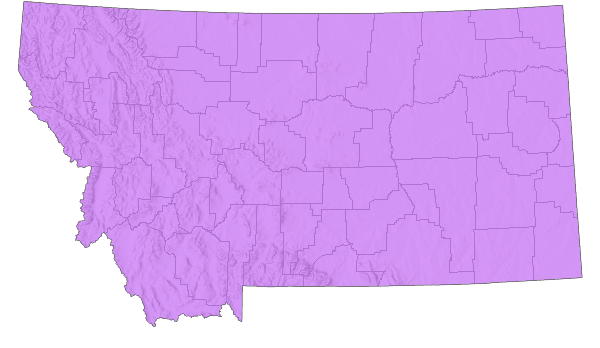
 Native
Native
Range Comments
Throughout western North America and extending eastward across southern Canada and the northern U.S. (Lavin in Lesica et al. 2012. Manual of Montana Vascular Plants. BRIT Press. Fort Worth, TX).
Observations in Montana Natural Heritage Program Database
Number of Observations: 141
(Click on the following maps and charts to see full sized version)
Map Help and Descriptions
Relative Density
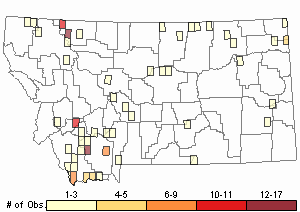
Recency
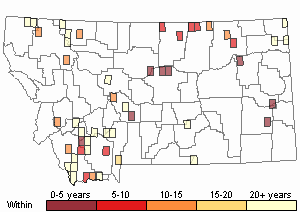
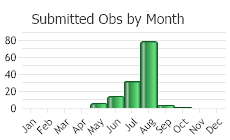
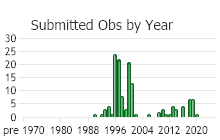
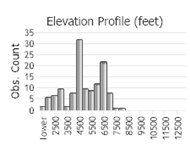 (Observations spanning multiple months or years are excluded from time charts)
(Observations spanning multiple months or years are excluded from time charts)
Habitat
Open dry to moist sites often on well drained and somewhat disturbed soils from low to montane elevations (Lavin in
Lesica et al. 2012. Manual of Montana Vascular Plants. BRIT Press. Fort Worth, TX).
Stewardship Responsibility
References
- Literature Cited AboveLegend:
 View Online Publication
View Online Publication Lesica, P., M.T. Lavin, and P.F. Stickney. 2012. Manual of Montana Vascular Plants. Fort Worth, TX: BRIT Press. viii + 771 p.
Lesica, P., M.T. Lavin, and P.F. Stickney. 2012. Manual of Montana Vascular Plants. Fort Worth, TX: BRIT Press. viii + 771 p.
- Additional ReferencesLegend:
 View Online Publication
View Online Publication
Do you know of a citation we're missing? Ament, R.J. 1995. Pioneer Plant Communities Five Years After the 1988 Yellowstone Fires. M.Sc. Thesis. Bozeman, MT: Montana State University. 216 p.
Ament, R.J. 1995. Pioneer Plant Communities Five Years After the 1988 Yellowstone Fires. M.Sc. Thesis. Bozeman, MT: Montana State University. 216 p. Anderson, N.L. 1951. Field studies on the biology of range grasshoppers of southeastern Montana. M.Sc. Thesis. Bozeman, Montana: Montana State University. 96 p.
Anderson, N.L. 1951. Field studies on the biology of range grasshoppers of southeastern Montana. M.Sc. Thesis. Bozeman, Montana: Montana State University. 96 p. Johnson, T. W. 1982. An analysis of pack and saddle stock grazing areas in the Bob Marshall Wilderness. M.Sc.Thesis. Bozeman, MT: Montana State University. 105 p.
Johnson, T. W. 1982. An analysis of pack and saddle stock grazing areas in the Bob Marshall Wilderness. M.Sc.Thesis. Bozeman, MT: Montana State University. 105 p. Lesica, P., M.T. Lavin, and P.F. Stickney. 2022. Manual of Montana Vascular Plants, Second Edition. Fort Worth, TX: BRIT Press. viii + 779 p.
Lesica, P., M.T. Lavin, and P.F. Stickney. 2022. Manual of Montana Vascular Plants, Second Edition. Fort Worth, TX: BRIT Press. viii + 779 p. Sater, S. 2022. The insects of Sevenmile Creek, a pictorial guide to their diversity and ecology. Undergraduate Thesis. Helena, MT: Carroll College. 242 p.
Sater, S. 2022. The insects of Sevenmile Creek, a pictorial guide to their diversity and ecology. Undergraduate Thesis. Helena, MT: Carroll College. 242 p. Seipel, T.F. 2006. Plant species diversity in the sagebrush steppe of Montana. M.Sc. Thesis. Bozeman, MT: Montana State University. 87 p.
Seipel, T.F. 2006. Plant species diversity in the sagebrush steppe of Montana. M.Sc. Thesis. Bozeman, MT: Montana State University. 87 p. Wood, A.K. 1987. Ecology of a prairie mule deer population. Ph.D. Dissertation. Bozeman, MT: Montana State University. 205 p.
Wood, A.K. 1987. Ecology of a prairie mule deer population. Ph.D. Dissertation. Bozeman, MT: Montana State University. 205 p.
- Web Search Engines for Articles on "Mat Muhly"





